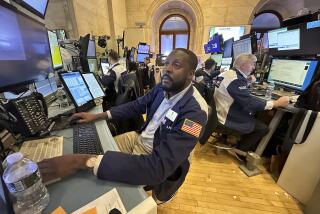Waiting on the gains that matter
- Share via
When psychologists and academics study how people come to decisions about investing, they focus in part on the risks of “belief perseverance.”
In short, belief perseverance posits that once we form an opinion about something, we’re reluctant to abandon that view even when the facts tell us we’re wrong.
That can lead to missed opportunities -- or worse.
For some investors, the facts of financial markets’ hefty gains over the last year are inconveniently at odds with what they want to believe about their lot.
It is a fact that nearly every stock market on the planet has rallied dramatically since March 2009. Ditto for most bond markets. The average U.S. stock mutual fund is up 45%; the average bond fund is up nearly 20%.
Unless you owned nothing but long-term government bonds it would have been virtually impossible to lose money in the markets over the last year.
Yet when a Bloomberg News poll last weekend asked 1,002 Americans nationwide how the value of their investments had fared compared with a year earlier, just 31% said their portfolio was better off.
An additional 22% said the value of their investments was the same, while 46% described their holdings as either “a lot worse” or “a little worse” than a year earlier.
It’s possible that Bloomberg found the nation’s 1,002 unluckiest investors. It’s also possible that the phrasing of the question somehow confused the respondents.
But I suspect something else is at work: The markets are up, yet so many people simply don’t believe that the rebound is real -- because they don’t believe that the economic recovery is real. So they still regard their investments as losers or laggards, even as stock market indexes have been hitting 17-month highs.
Sure enough, when the Bloomberg survey asked respondents to describe the economy today compared with a year ago, 57% said it was either a lot worse or a little worse.
Just as all politics is local, so too is economics. Many Americans understandably perceive no real improvement in their lives despite what the overall numbers tell us about, say, manufacturing activity, retail sales and home prices over the last year.
The University of Michigan’s national index of consumer confidence has stalled out this year, even as the stock market has continued to climb.
What has been lacking is job growth. And even though the labor market always is the last thing to recover after a recession, that is consolation only to economists -- not to the masses desperate for work.
Soon, though, the country may find that the employment situation finally has turned, at least by the government’s official monthly numbers of net job gains or losses.
Next Friday the Bureau of Labor Statistics will release its initial estimate of March employment trends. Many analysts believe the report will show a net gain of nearly 200,000 jobs for the month. Although the total will be inflated in part by the hiring of U.S. census workers, the March report nonetheless is widely expected to be the inflection point for the job market -- the beginning of a sustained upturn after the horrendous losses of the last two years.
We are, of course, climbing out of an extraordinarily deep hole. Even under the best of circumstances job growth is likely to be slow for years. Many people in their 50s and early 60s who are out of work will stay that way, maybe for the rest of their lives.
Yet for millions of Americans who have remained employed, a succession of headlines trumpeting job growth should build confidence that the worst is, in fact, over. And if you can stop worrying about losing your job, you should feel better about making decisions that you’ve postponed -- replacing your aging car or computer, for example. Or buying a house. Or having a child.
This is the way economic recoveries are supposed to unfold: Confidence rises, begetting more confidence.
Could this time be different? Maybe. The severity of the recession, the damage wrought by the housing bubble and the credit-market crash, and the disgust Americans feel toward bankers, regulators and politicians have fed the sense that things will never get better.
That is a very dangerous form of belief perseverance, because it can become contagious and self-fulfilling. Franklin D. Roosevelt understood that, which is why his 1933 inaugural address -- “The only thing we have to fear is fear itself” -- sought to banish despair and instill hope.
Now, as then, there is another fear that gnaws at some people’s confidence: the fear that the government’s moves to prop up the economy and financial system have gone too far.
For the last year, as the federal budget deficit has ballooned, critics have warned of a day of reckoning. Absent any attempt at fiscal discipline, they said, the Treasury would at some point find investors unwilling to continue providing trillions of dollars in cheap financing.
This week, markets may have fired the first shot across the bow: Treasury bond yields jumped amid weaker-than-expected demand at the government’s sale of $118 billion in new debt. The 10-year Treasury note yield, a benchmark for mortgage rates, ended at 3.85% on Friday, up from 3.69% a week ago and near the highest since mid-June.
If the economy is getting stronger, interest rates should rise. The Federal Reserve has been hoping to keep rates low for as long as possible, especially for the sake of the battered housing market and, no doubt, to avoid tripping the stock market. But the Fed can control only short-term rates; the bond market has a mind of its own.
Financial markets have had a great run over the last year, which has bolstered the recovery, whether or not most investors want to believe it. But what the economy needs now is to make the turn from persistent job losses to persistent job growth.
The belief we can’t afford to have persevere -- the view that most needs to be changed -- is that the economic recovery can’t be sustained. Job growth will be far more important in altering that perception than another rally in stocks or drop in interest rates.
--
tom.petruno@latimes.com
More to Read
Inside the business of entertainment
The Wide Shot brings you news, analysis and insights on everything from streaming wars to production — and what it all means for the future.
You may occasionally receive promotional content from the Los Angeles Times.










